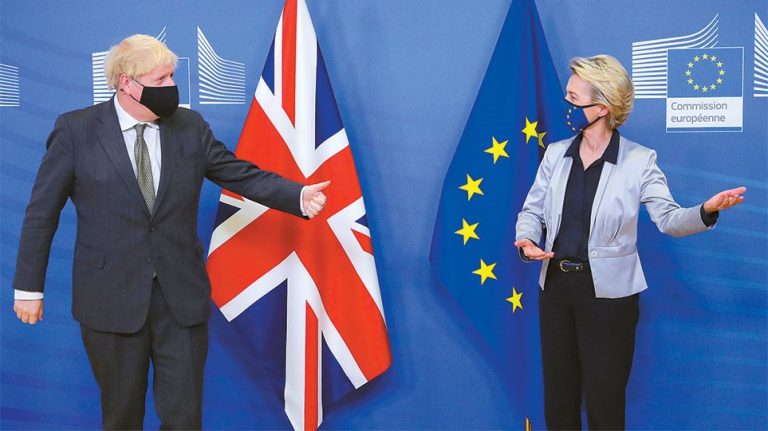As tough negotiations between the EU and the UK for the terms of the Brexit continue, three main issues of contentions have come to the fore; the conditions of competition, the access of EU fishermen in British waters, and how to control the implementation of any agreement once it is achieved.
The EU is effectively calling on London to commit indefinitely to the rules it will lay down. Boris Johnson has reiterated in all tones that Britain will leave the EU irrevocably on December 31, most likely without striking an amicable departure with Brussels. London’s negotiators are still trying to bridge the gap between the two sides, but “ending the transition period without such an agreement remains the most likely outcome,” according to a statement from the British prime minister’s spokesman.
With or without an agreement, Brexit will trigger developments related to a set of issues that affect Greece as well. The effects are estimated to impact almost all sectors of the economy, with exports, tourism, and the financial sector at the forefront.
The shift of the currency exchange rate with the strengthening of the euro against the pound sterling makes Greek exportable products more expensive and therefore less competitive. Greek exports to the United Kingdom amount to 2.5 billion euros annually, corresponding to 1.4% of GDP and mainly concern food, fresh and processed goods.
Students enrolled in UK universities in the next academic year (2021) and later will face a significant rise in tuition fees, as they will have to pay an amount commensurate to that of international students, which, on average (depending on the university and the degree), stands at 16,500 euros per year.
But those who are already enrolled and attending a university program before the end of December 2020 will not be affected by tuition hikes. This will not change as long as their studies last. That is, for those who have already started studies before the finalised Brexit date, nothing changes.
An interesting and unexpected aspect of Brexit related to Greece is the growing British interest in Greek real estate. After the implementation of Brexit, property buyers from Britain will be considered third-country nationals. And that means movement will not be free for them. Some of the British who work in many EU countries are turning to the acquisition of the Greek Golden Visa. First on their list is Spain and second Cyprus, while Portugal is also emerging as a strong player.
Another pleasant side-effect from the apparent fall of the pound sterling against the euro is that it will reduce the cost of living for Greek immigrants. The economic benefit will be proportional to the level at which the exchange rate of the two currencies will plateau. The benefit of a drop of sterling by about 10% can save 2,000-3,000 euros per year for each student.
In contrast, the fall of the pound against the euro will significantly increase the cost of British holidaymakers abroad and therefore is expected to reduce the flow of tourists from the United Kingdom to Greece. Another noteworthy effect will be that the healthcare provisions and hospitalisation will also change concerning citizens of both countries, as there will be no current cooperation between the Greek Ministry of Health and the British one.
also read
Is this tiny island really the lost home of the Aztecs?
15 Most powerful weapons in the World
Ask me anything
Explore related questions





